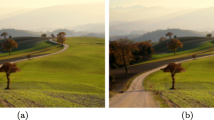Abstract
Copy-move (region duplication) is one of the most common types of image forgeries, in which at least one part of an image is copied and pasted onto another area of the same image. The main aims of the copy-move forgery are to overemphasize a concept or conceal objects by duplicating some regions. Keypoint-based copy-move forgery detection (CMFD) schemes extract image keypoints and employ local image features to identify duplicated regions, which exhibits remarkable detection performance with respect to memory requirement, computational cost, and robustness. To enhance the performance of keypoint-based CMFD approaches, here are three issues that need to be solved: the non-uniform distribution of image keypoints, the low discriminatory power of local image descriptor, and the high computational cost and low matching efficiency of feature matching strategy. In order to overcome these issues, we propose a new copy-move forgery detection method based on adaptive keypoints extraction and matching in this paper. First, we extract the image keypoints using the adaptive uniform distribution threshold. Second, the binary robust invariant scalable keypoints (BRISK) descriptor is introduced to represent the local image feature of image keypoints. Afterwards, local BRISK descriptors are employed to match image keypoints by using embedded random ferns approach, which formulates the required matching as a discriminative classification problem. Finally, the falsely matched keypoints pairs are eliminated by utilizing the random sample consensus (RANSAC), and the fast mean-residual normalized intensity correlation (NNPROD) is employed to locate the tampering area. We evaluate the performance of the proposed CMFD method in detail by conducting several simulation experiments, and the experimental results have shown that the detection and localization accuracy of the proposed method is superior to that of the state-of-the-art approaches recently proposed in the literature, even in adverse conditions.

















Similar content being viewed by others
References
Amerini I, Ballan L, Caldelli R (2011) A SIFT-based forensic method for copy-move attack detection and transformation recovery. IEEE Trans on Information Forensics & Security 6(3):1099–1110
Amerini I, Ballan L, Caldelli R, Del Bimbo A, Del Tongo L, Serra G (2013) Copy-move forgery detection and localization by means of robust clustering with J-Linkage. Signal Process Image Commun 28(6):659–669
Asikuzzaman M, Pickering MR (2017) An overview of digital video watermarking. IEEE Trans on Circuits and Systems for Video Technology 28(9):2131–2153
Bay H, Ess A, Tuytelaars T et al (2008) Speeded-up robust features (SURF). Comput Vis Image Underst 110(3):346–359
Birajdar GK, Mankar VH (2013) Digital image forgery detection using passive techniques: A survey. Digit Investig 10(3):226–245
Bosch A, Zisserman A, Munoz X (2007) Image Classification using random forests and ferns. IEEE 11th International Conference on Computer Vision, Rio de Janeiro, pp 1–8
Bravo-Solorio S, Nandi AK (2011) Exposing duplicated regions affected by reflection, rotation and scaling. 2011 IEEE International Conference on Acoustics, Speech and Signal Processing (ICASSP), Prague, pp 1880–1883
Christlein V, Riess C, Jordan J (2012) An evaluation of popular copy-move forgery detection approaches. IEEE Trans on Information Forensics & Security 7(6):1841–1854
Cozzolino D, Poggi G, Verdoliva L (2014) Copy-move forgery detection based on patchmatch. 2014 IEEE International Conference on Image Processing (ICIP), Paris, pp 5312–5316
Cozzolino D, Poggi G, Verdoliva L (2015) Efficient dense-field copy-move forgery detection. IEEE Trans on Information Forensics and Security 10(11):2284–2297
Dixit R, Naskar R (2017) Review, analysis and parameterization of techniques for copy–move forgery detection in digital image. IET Image Process 11(9):746–759
Donoser M, Schmalstieg D (2014) Discriminative feature-to-point matching in image-based localization. 2014 IEEE Conference on Computer Vision and Pattern Recognition (CVPR), Columbus, pp 516–523
Fridrich J, Soukal D, Lukas J (2003) Detection of copy-move forgery in digital images. In: Proceedings of Digital Forensic Research Workshop, Cleveland
Gong J, Guo J (2016) Image copy-move forgery detection using SURF in opponent color space. Transactions of Tianjin University 22(2):151–157
Huang H, Guo W, Zhang Y (2008) Detection of copy-move forgery in digital images using SIFT algorithm, vol 2. Pacific-Asia Workshop on Computational Intelligence and Industrial Application (PACIIA), Wuhan, pp 272–276
Jin G, Wan X (2017) An improved method for SIFT-based copy–move forgery detection using non-maximum value suppression and optimized J-Linkage. Signal Process Image Commun 57:113–125
Kakar P, Sudha N (2012) Exposing postprocessed copy-paste forgeries through transform-invariant features. IEEE Trans on Information Forensics & Security 7(3):1018–1028
Korus P (2017) Digital image integrity–a survey of protection and verification techniques. Digital Signal Processing 71:1–26
Kumar S, Desai JV, Mukherjee S (2016) A fast keypoint based hybrid method for copy move forgery detection. Computer Vision and Pattern Recognition 4(2):91–99
Lepetit V, Fua P (2013) Keypoint recognition using random forests and random ferns. Decision Forests for Computer Vision and Medical Image Analysis:111–124
Leutenegger S, Chli M, Siegwart RY (2011) BRISK: Binary Robust invariant scalable keypoints. 2011 International Conference on Computer Vision, Barcelona, pp 2548–2555
Li J, Li X, Yang B, Sun X (2015) Segmentation-based image copy-move forgery detection scheme. IEEE Trans on Information Forensics & security 10(3):507–518
Li C, Yu F, Lin Z, Kang X (2016) A novel fast target tracking based on video image. Proceedings of the 35th Chinese Control Conference, Chengdu, pp 10264–10268
Li Y, Zhou J (2018) Fast and effective image copy-move forgery detection via hierarchical feature point matching. IEEE Trans on Information Forensics and Security 14(5):1307–1322
Manu VT, Mehtre BM (2016) Detection of copy-move forgery in images using segmentation and SURF. Advances in Intelligent Systems and Computing, Cham, pp 645–654
Muhammad G, Hussain M, Bebis G (2012) Passive copy move image forgery detection using undecimated dyadic wavelet transform. Digit Investig 9(1):49–57
Muhammad AQ, Mohamed D (2015) A bibliography of pixel-based blind image forgery detection techniques. Signal Process Image Commun 39(Part A):46–74
Muzaffer G, Karaagacli ES (2017) Recent keypoint based copy move forgery detection techniques. 2017 International Artificial Intelligence and Data Processing Symposium (IDAP), Malatya, pp 1–7
Ozuysal M, Calonder M, Lepetit V, Fua P (2009) Fast keypoint recognition using random ferns. IEEE Trans on Pattern Analysis and Machine Intelligence 32(3):448–461
Pan X, Lyu S (2010) Region duplication detection using image feature matching. IEEE Trans on Information Forensics and Security 5(4):857–867
Pun C, Yuan X, Bi X (2015) Image forgery detection using adaptive over-segmentation and feature point matching. IEEE Trans on Information Forensics Security 10(8):1705–1716
Ryu SJ, Lee MJ, Lee HK (2010) Detection of copy-rotate-move forgery using Zernike moments. International Workshop on Information Hiding, Berlin, Heidelberg, pp 51–65
Sachdev K, Kaur M, Gupta S (2017) A robust and fast technique to detect copy move forgery in digital images using SLIC segmentation and SURF keypoints. Proceeding of International Conference on Intelligent Communication, Control and Devices. Springer Singapore, 479: 787-793
Silva E, Carvalho T, Ferreira A, Rocha A (2015) Going deeper into copy-move forgery detection: Exploring image telltales via multi-scale analysis and voting processes. J Vis Commun Image Represent 29:16–32
Soni B, Das PK, Thounaojam DM (2018) CMFD: a detailed review of block based and key feature based techniques in image copy-move forgery detection. IET Image Process 12(2):167–178
Sun L, Ji S, Ye J (2011) Canonical correlation analysis for multilabel classification: A least-squares formulation, extensions, and analysis. IEEE Trans on Pattern Analysis & Machine Intelligence 33(1):194–200
Teerakanok S, Uehara T (2019) Copy-Move Forgery Detection: A State-of-the-Art Technical Review and Analysis. IEEE Access 7:40550–40568
Wang XY, Li S, Liu YN, Niu Y et al (2017) A new keypoint-based copy-move forgery detection for small smooth regions. Multimed Tools Appl 76(22):23353–23382
Wang H, Wang HX (2018) Perceptual Hashing-Based Image Copy-Move Forgery Detection. Security and Communication Networks
Wang H, Wang HX, Sun XM, Qian Q (2017) A passive authentication scheme for copy-move forgery based on package clustering algorithm. Multimed Tools Appl 76(10):12627–12644
Yang F, Li J, Lu W, Weng J (2017) Copy-move forgery detection based on hybrid features. Eng Appl Artif Intell 59:73–83
Yang B, Sun X, Guo H, Xia Z, Chen X (2018) A copy-move forgery detection method based on CMFD-SIFT. Multimed Tools Appl 77(1):837–855
Yao H, Cao F, Tang Z, Wang J, Qiao T (2018) Expose noise level inconsistency incorporating the inhomogeneity scoring strategy. Multimed Tools Appl 77(14):18139–18161
Yao H, Wang S, Zhang X, Qin C, Wang J (2017) Detecting image splicing based on noise level inconsistency. Multimed Tools Appl 76(10):12457–12479
Yavuz AA, Mudgerikar A, Singla A, Papapanagiotou I, Bertino E (2017) Real-time digital signatures for time-critical networks. IEEE Trans on Information Forensics Security 12(11):2627–2639
Zandi M, Mahmoudi-Aznaveh A, Talebpour A (2016) Iterative copy-move forgery detection based on a new interest point detector. IEEE Trans on Information Forensics and Security 11(11):2499–2512
Zhao J, Guo J (2013) Passive forensics for copy-move image forgery using a method based on DCT and SVD. Forensic Sci Int 233(1-3):158–166
Acknowledgments
This work was supported partially by the National Natural Science Foundation of China (Nos. 61701212 & 61472171), China Postdoctoral Science Foundation (No. 2017 M621135, 2018 T110220), and High-level Innovation Talents Foundation of Dalian (No.2017RQ055).
Author information
Authors and Affiliations
Corresponding authors
Additional information
Publisher’s note
Springer Nature remains neutral with regard to jurisdictional claims in published maps and institutional affiliations.
Rights and permissions
About this article
Cite this article
Yang, HY., Qi, SR., Niu, Y. et al. Copy-move forgery detection based on adaptive keypoints extraction and matching. Multimed Tools Appl 78, 34585–34612 (2019). https://doi.org/10.1007/s11042-019-08169-w
Received:
Revised:
Accepted:
Published:
Issue Date:
DOI: https://doi.org/10.1007/s11042-019-08169-w





